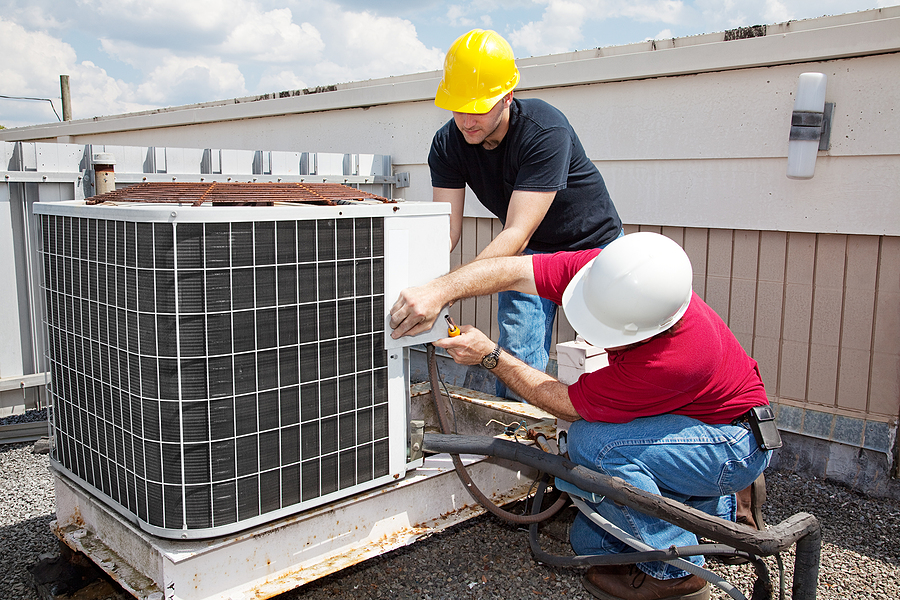Owning or managing a commercial property is a significant responsibility. Beyond the day-to-day operations, the long-term health and value of your asset depend on consistent, proactive care. Neglecting building maintenance can lead to a cascade of problems, from unhappy tenants and safety hazards to expensive, emergency repairs. A well-executed preventative maintenance plan is not just about fixing what’s broken; it’s a strategic approach to protect your investment and maximize your commercial property ROI.
This guide provides a comprehensive overview of preventative maintenance for commercial properties. We will cover the essential checks and tasks for your building’s core systems—from HVAC and plumbing to fire safety and exterior care. Understanding these elements will help you create a robust maintenance schedule that saves money, enhances safety, and keeps your property in prime condition for years to come.

Commercial Maintenance and Preventative Care
Keep Your Cool: HVAC System Maintenance
A building’s heating, ventilation, and air conditioning (HVAC) system is the heart of its daily operations, directly impacting tenant comfort and energy consumption. An inefficient system not only leads to complaints but also drives up utility bills. Regular commercial facility maintenance for your HVAC system is crucial.
Key tasks include:
- Filter Changes: Replace filters at least quarterly to ensure clean airflow and reduce strain on the system.
- Coil Cleaning: Annually clean evaporator and condenser coils to maintain efficiency.
- Duct Inspections: Check for leaks in ductwork, which can lead to significant energy loss.
- Professional Tune-Ups: Schedule semi-annual inspections with a certified technician to check refrigerant levels, test electrical components, and ensure the system operates safely and efficiently.
Following these steps helps you comply with regulations regarding energy efficiency and emissions and improves your property’s indoor air quality—a growing priority for many tenants.
Go with the Flow: Plumbing Maintenance
Water damage from a seemingly minor plumbing issue can quickly escalate into a costly disaster, causing structural damage and potential mold growth. Proactive plumbing maintenance is essential for preventing such emergencies.
Regular plumbing checks should involve:
- Leak Inspections: Regularly inspect pipes, fixtures, and faucets for any signs of leaks or corrosion.
- Drain Cleaning: Clear drains to prevent clogs and backups, especially in high-use areas like restrooms and kitchens.
- Water Pressure Checks: Test water pressure to ensure it’s within a safe range, as high pressure can stress pipes and fixtures.
- Water Heater Maintenance: Annually inspect and flush water heaters to remove sediment buildup, which extends their lifespan and improves efficiency.
Request a Bid for Construction Management Today! ✅
Stay Powered Up: Electrical System Maintenance
A building’s electrical system is its central nervous system, and malfunctions can pose serious fire risks and cause significant operational downtime. Regular building maintenance of electrical components is a non-negotiable safety requirement.
Important tasks for your electrical system include:
- Wiring and Outlet Inspections: Periodically check for frayed wires, loose connections, and damaged outlets.
- GFCI Outlet Testing: Regularly test Ground Fault Circuit Interrupter (GFCI) outlets in kitchens, bathrooms, and outdoor areas to ensure they function correctly.
- Breaker Replacement: Replace faulty or outdated circuit breakers to prevent overloads.
- Proper Grounding: Ensure all electrical systems are properly grounded to protect against power surges and reduce the risk of electrocution. Adhering to OSHA guidelines during these checks is vital for workplace safety.
Raise the Roof: Proactive Roof Maintenance
Your property’s roof is its first line of defense against the elements. Even small leaks or minor damage can lead to major interior issues if left unaddressed. Consistent roof inspections can save you from expensive water damage and structural repairs down the line.
A thorough roof maintenance plan includes:
- Damage Inspections: After major storms and at least twice a year, inspect the roof for missing shingles, cracks, or blisters.
- Debris Removal: Clear leaves, branches, and other debris from the roof surface, gutters, and downspouts to prevent water pooling.
- Drainage Checks: Ensure all drainage systems are clear and functioning correctly to prevent water from backing up.
- Resealing: Check and reseal flashing around vents, skylights, and chimneys as needed to prevent water intrusion.
First Impressions: Landscaping and Exterior Care
The exterior of your property is the first thing tenants and visitors see. A well-maintained landscape and facade not only boost curb appeal but also contribute to the overall value and safety of your property.
Exterior maintenance tasks should cover:
- Landscaping: Implement regular lawn care, tree trimming, and weed control. Ensure irrigation systems are efficient and in good repair to conserve water.
- Exterior Walls: Inspect siding and facades for cracks, water damage, or pest infestations.
- Pest Control: Engage professional pest control services for preventative treatments to avoid infestations.
- Security Systems: Routinely check that security cameras, alarm systems, and access controls are fully operational.
- Parking Lots and Walkways: Repair cracks and potholes in parking lots and ensure walkways are clear and safe, in compliance with ADA accessibility standards.
Stay Ahead: Renovations and Fire Safety Upgrades
Keeping your property modern and compliant is a key part of commercial property maintenance. This includes planning for commercial renovations and ensuring your life-safety systems are up to date.
A fire suppression system upgrade is particularly critical. Regular inspections of fire extinguishers, sprinkler systems, and fire alarms are required by local building codes. An outdated system not only puts lives at risk but also exposes you to significant legal and financial liability.
Beyond fire safety, consider other upgrades to enhance your property. Smart building technologies, such as IoT sensors for predictive maintenance, can provide real-time data to help you address issues before they become problems. Energy-efficient upgrades and sustainable maintenance practices can also reduce operational costs and appeal to environmentally conscious tenants.
Frequently Asked Questions
Why is preventative maintenance so important for commercial properties?
Preventative maintenance is crucial because it helps identify and fix small issues before they escalate into major, costly repairs. It enhances tenant safety and satisfaction, extends the life of critical systems like HVAC and plumbing, ensures regulatory compliance, and ultimately increases your commercial property ROI by preserving its value and reducing operational downtime.
How often should I perform maintenance on my commercial property?
The frequency depends on the system. For example, HVAC filters should be changed quarterly, while a professional tune-up is recommended semi-annually. Roofs and electrical systems should be inspected at least twice a year and after major weather events. A customized maintenance schedule based on your property’s specific needs is the best approach.
What are some industry trends in commercial property maintenance?
Current trends include adopting sustainable practices like using eco-friendly products, integrating smart building technologies with IoT sensors for predictive maintenance, and using drones for remote inspections. There is also a greater focus on improving indoor air quality through advanced HVAC systems and incorporating green spaces like green roofs.
How can preventative maintenance help with budgeting?
Preventative maintenance makes costs more predictable. Instead of facing large, unexpected bills for emergency repairs, you can budget for scheduled maintenance tasks. This allows for better financial planning and a more stable operational budget.
Key Takeaways
Consistent preventative maintenance is the most effective strategy for protecting your commercial property’s value and ensuring its long-term success. By addressing small issues before they become major problems, you reduce costly repairs, extend the lifespan of your equipment, and create a safer, more satisfying environment for your tenants. This proactive approach not only minimizes unexpected downtime but also allows for more predictable budgeting and financial planning, ultimately boosting your commercial property ROI.
Don’t wait for an emergency to think about maintenance. Contact us today for a quote and let our team help you develop a comprehensive maintenance plan tailored to your property’s unique needs.
Related Post: General Contractor Advice for Commercial Building Repairs and Maintenance
